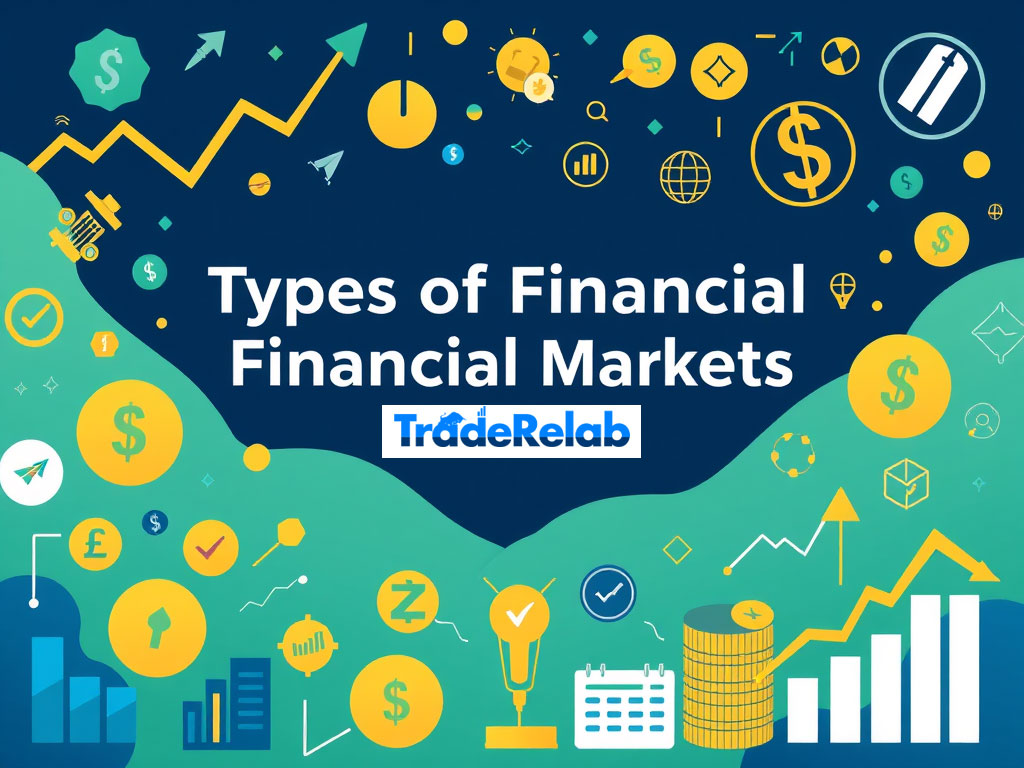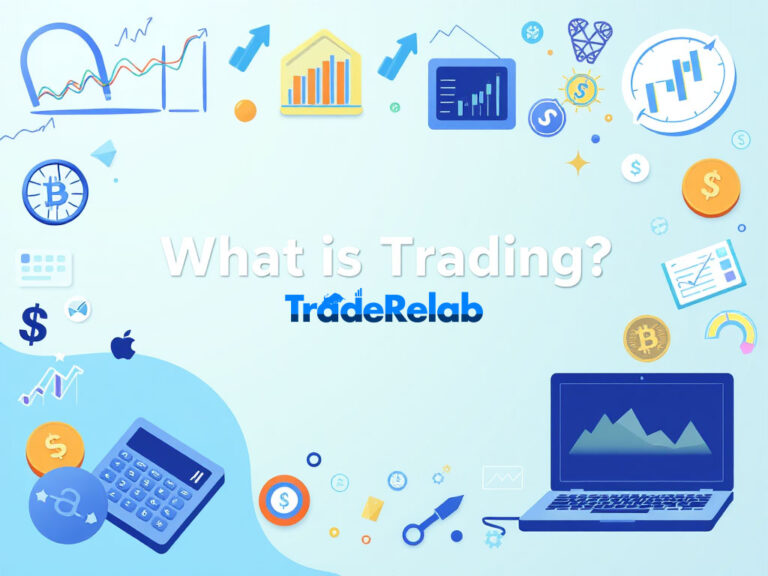Types of Financial Markets Explained

Types of Financial Markets Explained
Financial markets are essential to the global economy. They provide a space for trading, investing, and raising capital. These markets are diverse, including stocks, bonds, and commodities, and understanding them helps you make informed financial decisions.
The history of financial markets dates back to early trade and commerce. Today, they are more accessible than ever due to online platforms and digital technologies. They play a vital role in helping businesses raise funds, allowing investors to trade, and helping individuals manage financial risks. Trading in these markets is often associated with stocks, which represent ownership in companies and are traded on exchanges.

There are several types of financial markets, such as stocks, bonds, forex, commodities, and derivatives. Each market has its unique features, risks, and opportunities. Understanding these markets allows investors and traders to make better choices, whether they are interested in stocks or other financial products.
Introduction to Trading
Trading in financial markets involves buying and selling financial assets such as stocks, bonds, and commodities to make a profit. These markets are essential for trading, investing, and raising capital. They play a crucial role in the global economy’s health, and with the right knowledge, anyone can confidently navigate them and make smart investment choices.
Key Takeaways:
- Financial markets provide platforms for trading, investing, and raising capital.
- Understanding the different types of financial markets is key to making informed decisions.
- Trading involves buying and selling securities like stocks and bonds.
- Financial markets are crucial to the global economy’s function.
- With the right knowledge, individuals can navigate financial markets with confidence.
Understanding Financial Markets: The Basics
Financial markets are fundamental to the economy. They facilitate the movement of money and investments. In these markets, buyers and sellers exchange securities, commodities, and other assets. Understanding how these markets work is essential for successful trading.
Various participants are involved in these markets. Investors, both individual and institutional, trade stocks, bonds, and other assets. Market makers keep the markets liquid by always being available to buy and sell.
These markets help companies access capital to fund growth and innovation, while also allowing investors to manage risks and generate returns.
- Platform for Buying and Selling: Financial markets provide a space to exchange securities.
- Raising Capital: They enable companies to raise funds through stock and bond issuances.
- Risk Management: They allow investors to manage risks via trading and hedging.
- Investment Opportunities: They offer numerous investment opportunities for individuals and institutions.
By learning the basics of financial markets, you’ll be better equipped to understand trading and investments. Knowing the participants and how the markets operate helps you make smarter choices and manage risks effectively.
Stock Market Fundamentals
The stock market is one of the most important financial markets. It provides a platform for individuals and institutions to buy and sell stocks, which represent ownership in companies. The stock market plays a critical role in the economy, enabling the transfer of funds from investors to businesses.
Stocks come in different types, including:
- Common Stocks: These offer voting rights to shareholders.
- Preferred Stocks: These offer more financial rights but no voting rights.
- Growth Stocks: These belong to companies experiencing rapid growth.
The stock market is composed of various participants, including individual investors, large institutional investors like pension funds, and market makers, who help ensure liquidity by offering to buy and sell stocks at competitive prices.
Stock market indices, like the S&P 500 and Dow Jones, are used to track overall market performance. These indices give investors insight into how the market is doing and help them make informed decisions.
The Bond Market Explained
Bonds are a low-risk investment that provide regular income. The bond market is where governments, corporations, and other entities raise funds by issuing debt securities. Understanding the bond market is essential for making informed investment decisions.
The bond market includes:
- Government Bonds: Issued by national governments.
- Corporate Bonds: Issued by companies.
- Municipal Bonds: Issued by local governments for funding public projects.
By investing in bonds, individuals can earn returns through interest payments while diversifying their portfolios. The bond market plays an important role in trading and investment.
Foreign Exchange (Forex) Trading Essentials
Forex trading involves buying and selling currencies to make a profit. It is one of the largest and most active financial markets, with daily trading exceeding $6 trillion.
Understanding key concepts, such as:
- Major Currency Pairs: Popular pairs like EUR/USD, USD/JPY, and GBP/USD.
- Market Hours: The forex market operates 24 hours a day, 5 days a week, divided into different global trading sessions.
- Exchange Rates: Determined by supply and demand, these rates impact currency values and trading strategies.

By understanding these elements, traders can make smarter decisions and increase their chances of success in forex trading.
Commodity Markets and Raw Materials
Commodity markets play a key role in the global economy by facilitating the trading of goods like energy, metals, and agricultural products. These markets are vital for risk management, as they allow traders to hedge against price fluctuations.
Commodity markets offer investment opportunities and are affected by supply and demand factors, global events, and weather conditions. Understanding the basics of commodity trading is crucial for investors and traders.
Understanding Derivatives Markets
Derivatives are financial contracts whose value is based on the price of an underlying asset, such as stocks or bonds. They play an important role in risk management and speculation.
The derivatives market includes instruments such as:
- Options: Contracts that allow traders to buy or sell assets at predetermined prices.
- Futures, Swaps, and Forwards: Used for hedging risks or speculating on price movements.

Derivatives markets provide opportunities for advanced trading strategies. By understanding the different types of derivatives, investors can manage risks and take advantage of market movements.
Getting Started with Trading in Financial Markets
If you’re new to trading, it’s essential to understand the basics of financial markets. Trading can be exciting and profitable, but it requires careful planning and knowledge.
Key steps to getting started:
- Choose a Market: Understand the characteristics of each market and select one to focus on.
- Use the Right Tools: Trading platforms like MetaTrader and TradingView can help you stay informed.
- Practice Risk Management: Set goals, use risk-reward ratios, and apply stop-loss orders.
Cryptocurrency Markets: The New Frontier
Cryptocurrencies have revolutionized the financial industry by offering new ways to trade and invest. Popular coins like Bitcoin and Ethereum provide high return potential but come with high risk.
Before trading cryptocurrencies, consider factors like:
- Liquidity: Can you quickly buy or sell your coins?
- Volatility: Cryptocurrency prices can fluctuate wildly.
- Security: Protect your digital assets from cyber threats.
As the crypto market continues to grow, staying informed is key to making wise investment choices.
Conclusion: Making Informed Trading Decisions
To succeed in trading, it’s crucial to understand the various financial markets and the risks involved. Whether you’re trading stocks, bonds, or cryptocurrencies, knowledge and preparation are key.
By staying informed and following a disciplined trading plan, you can achieve long-term success in financial markets.
FAQ
- What are the different types of financial markets?
Financial markets include the stock, bond, forex, commodity, and derivatives markets. - What are the major currency pairs in forex?
Major pairs include EUR/USD, USD/JPY, and GBP/USD. - How can I get started with trading in financial markets?
Start by choosing a market, learning about risk management, and using the right trading tools.






